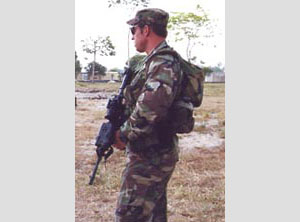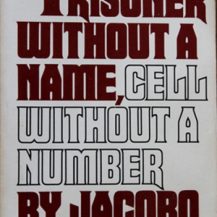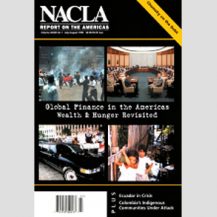Washington’s Colombian Habit
Just what are U.S. taxpayers getting for the billions of dollars spent in Colombia?
This text originally published: 30 May 2005

As U.S. involvement in Colombia’s civil war reaches dangerous new levels, there are new allegations about just what U.S. taxpayers are getting for the billions of dollars. In the last two months, five U.S. soldiers have been arrested on cocaine smuggling charges, two other U.S. troops were arrested for allegedly arranging an arms deal with Colombia’s right-wing paramilitaries, and—despite running the largest current account deficit in U.S. history—the Bush Administration is now seeking an additional $734 million to continue its counternarcotics folly in Colombia, despite no evidence of a reduction in supply.
In the most recent scandal to plague the embattled U.S. military, Warrant Officer Allan N. Tanquary and Sergeant Jesus Hernandez of the 7th Special Forces Group based at Fort Bragg were arrested by Colombian police on May 3. Serving in Colombia as part of the U.S. contingent of 800 military advisors to the Colombian military, the pair were caught with three Colombian civilians and over 40,000 rounds of ammunition that Colombian officials say were destined to be sold to members of Colombia’s right-wing paramilitaries, a group with which the Colombian military is theoretically at war, and which the U.S. government considers a terrorist organization.
The U.S. Embassy in Bogotá took immediate steps to have the two arrestees turned over to U.S. custody so that they could be shuttled to the United States under a 1974 treaty that ensures U.S. officials and soldiers “diplomatic immunity” in Colombia. On May 5, with aggravation mounting in Bogotá, Colombia’s Inspector General requested a one-day delay in the planned handover so that he could investigate the legality of the 1974 treaty under Colombia’s 1991 constitution, but the Colombian Attorney General’s office had already passed the pair to U.S. embassy officials. Then, the Attorney General’s office had an overnight change of heart and on the morning of May 6 requested permission to question Tanquary and Hernandez. The U.S. Embassy initially agreed to the request, but then quickly whisked the two soldiers back to the United States.
The incident has proven quite an embarrassment to the U.S. military and diplomatic corps, since Colombia’s paramilitaries are included on the U.S. State Department’s list of Foreign Terrorist Organizations. State Department Spokesman Richard Boucher jumped in on damage control: “There is absolutely no U.S. policy and U.S. support or U.S. inclination or U.S. military operations involved in arming paramilitaries… We have declared these groups to be terrorist groups.”
The diplomatic flurry continued, with several big guns called out to help diffuse the tension. On May 11, General Bantz Craddock, the head of the U.S. military’s Southern Command, appeared at a school opening in Colombia and stated, “I can assure you that within the U.S. military investigations will be thorough and complete… The required persons will be held accountable.” Addressing the House International Relations Committee in Washington that same day, Assistant Secretary of State for the Western Hemisphere Roger Noriega stated, “We continue to monitor the investigation by Colombian and U.S. authorities into developments last week in which U.S. military trainers on temporary duty in Colombia were alleged to be involved in trafficking in ammunition. All affected agencies take these allegations very seriously; we recognized what is at stake. We and the Colombian government intend to get to the bottom of it.”
Also on May 11, the Washington Times ran a commentary by the recently retired Assistant Secretary of State for International Narcotics and Law Enforcement, Robert Charles, in which he advocated for the renewal of Plan Colombia, touting such benefits to Colombia as the Plan’s training program in the “culture of lawfulness” and underscoring its importance as a bulwark against “divisive radical socialism” emanating from Venezuela. While giving a hard sell for additional Plan Colombia funding that is all but guaranteed in Washington, Charles neglected to mention the recent arrests of seven U.S. soldiers on arms- and drug-smuggling charges tied to their participation in Plan Colombia.
The May arrests of Tanquary and Hernandez come in the wake of another smuggling scandal involving U.S. troops in Colombia. In March this year, five U.S. soldiers were arrested for allegedly smuggling 16 kilos of cocaine with a street value estimated to be between $300,000 and $500,000 to the United States aboard a U.S. military aircraft. Despite calls from Colombian lawmakers for the soldiers to stand trial in Colombia—especially because Colombia has honored hundreds of U.S. extradition requests in narcotrafficking cases—the United States would not consider the extradition requests, insisting the five soldiers had diplomatic immunity under the 1974 arrangement.
In 1999, another problematic episode brought considerable embarrassment to U.S. operations in Colombia. That year, Laurie Hiett—the wife of U.S. Colonel James Hiett, then-coordinator of U.S. anti-drug activities in Colombia—pleaded guilty to smuggling some $700,000 worth of cocaine and heroin to the United States using diplomatic postal services. Laurie Hiett received a five-year sentence, while her husband, who pleaded guilty to money laundering charges related to the smuggled drugs, only received a five-month prison sentence, outraging many Colombians.
It should come as no surprise that U.S. personnel stationed in Colombia are succumbing to the corruptive influence of the illegal trades that help fuel the country’s conflict. With the U.S. street value of cocaine, according to White House ONDCP figures, at between $10,000 and $36,000 per kilo, the incentive of the profits to be made from even a single successful smuggling deal cannot be underestimated. Given that a few kilos of smuggled cocaine has a value in the range of the yearly salaries of many U.S. personnel in Colombia, and considering the ready accessibility of cocaine there, the temptation is considerable. The Colombian arms trade offers similar opportunities for illicit rewards.
U.S. taxpayers should expect much more of this behavior in the future, as Washington is sucked deeper into the vortex of Colombia’s endless war. The Bush Administration recently increased the number of U.S. military personnel in Colombia from 400 to 800, in addition to the 600 private military contractors performing various roles there. Plan Colombia has already cost taxpayers $3.5 billion, and has signally failed to accomplish its original objective: the eradication of coca and poppy plants, which are planted anew or more effectively hidden after each fumigation flight. According to satellite data touted by the White House in March this year, the area of Colombian land under coca cultivation remained stable during 2004, unchanged from the 2003 level of 114,000 hectares.
On the other hand, with each dollar spent on Plan Colombia, the United States is drawn more inextricably into the Colombian state’s counterinsurgency war. As President Bush seeks Congressional support for his $734 million one-year renewal of Plan Colombia, it is time to once again reflect on Washington’s Colombian habit.
Notes
Image: U.S. Special Forces in Saravena, Colombia. Photo: Garry Leech
This article originally appeared in Colombia Journal, an online journal that was published by the Information Network of the Americas (INOTA).


